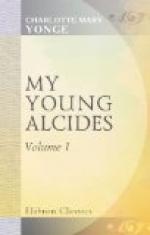However, the effect was, that Harold summoned a special meeting of the shareholders, the same being nearly identical with the Directors of the Hydriot Company, and these contrived to get George Yolland, Esquire, appointed chemist and manager of the works, with a salary of 70 pounds per annum, to be increased by a percentage on the sales! Crabbe objected vehemently, but was in the minority. The greater number were thoroughly believers in the discovery made on that unlucky night, or else were led away by that force of Harold’s, which was almost as irresistible by mind, as by matter. But the tidings were received with horror by the town. Three nervous old ladies who lived near the Lerne gave notice to quit, and many declared that it was an indictable offence.
Small as the salary was, it was more than young Yolland was clearing by his connection with Dr. Kingston; and as he would have to spare himself during the next few months, and could not without danger undertake the exertions of a wide field of Union practice, the offer was quite worth his acceptance. Moreover, he had the enthusiasm of a practical chemist, and would willingly have starved to see his invention carried out, so he received the appointment with the gruff gratitude that best suited Harold; and he and his brother were to have rooms in the late “Dragon’s Head,” so soon as it should have been rebuilt on improved principles, with a workman’s hall below, and a great court for the children to play in by day and the lads in the evening.
Of the clerical Yolland we saw and heard very little. Harold was much relieved to find that even before his brother could move beyond the sofa, he was always out all day, for though he had never spoken a word that sounded official, Harold had an irrational antipathy to his black attire. Nor did I hear him preach, except by accident, for Arghouse chapelry was in the beat of the other curate, and in the afternoon, when I went to Mycening old church, he had persuaded Mr. Crosse to let him begin what was then a great innovation—a children’s service, with open doors, in the National School-room. Miss Woolmer advised me to try the effect of this upon Dora, whose Sundays were a constant perplexity and reproach to me, since she always ran away into the plantations or went with Harold to see the horses; and if we did succeed in dragging her to church, there behaved in the most unedifying manner.
“I don’t like the principle of cutting religion down for children,” said my old friend. “They ought to be taught to think it a favour to be admitted to grown-up people’s services, and learn to follow them, instead of having everything made to please them. It is the sugar-plum system, and so I told Mr. Ben, but he says you must catch wild heathens with sugar; and as I am afraid your poor child is not much better, you had better try the experiment.”
I did try it, and the metrical litany and the hymns happily took Dora’s fancy, so that she submitted to accompany me whenever Harold was to sit with George Yolland, and would not take her.




